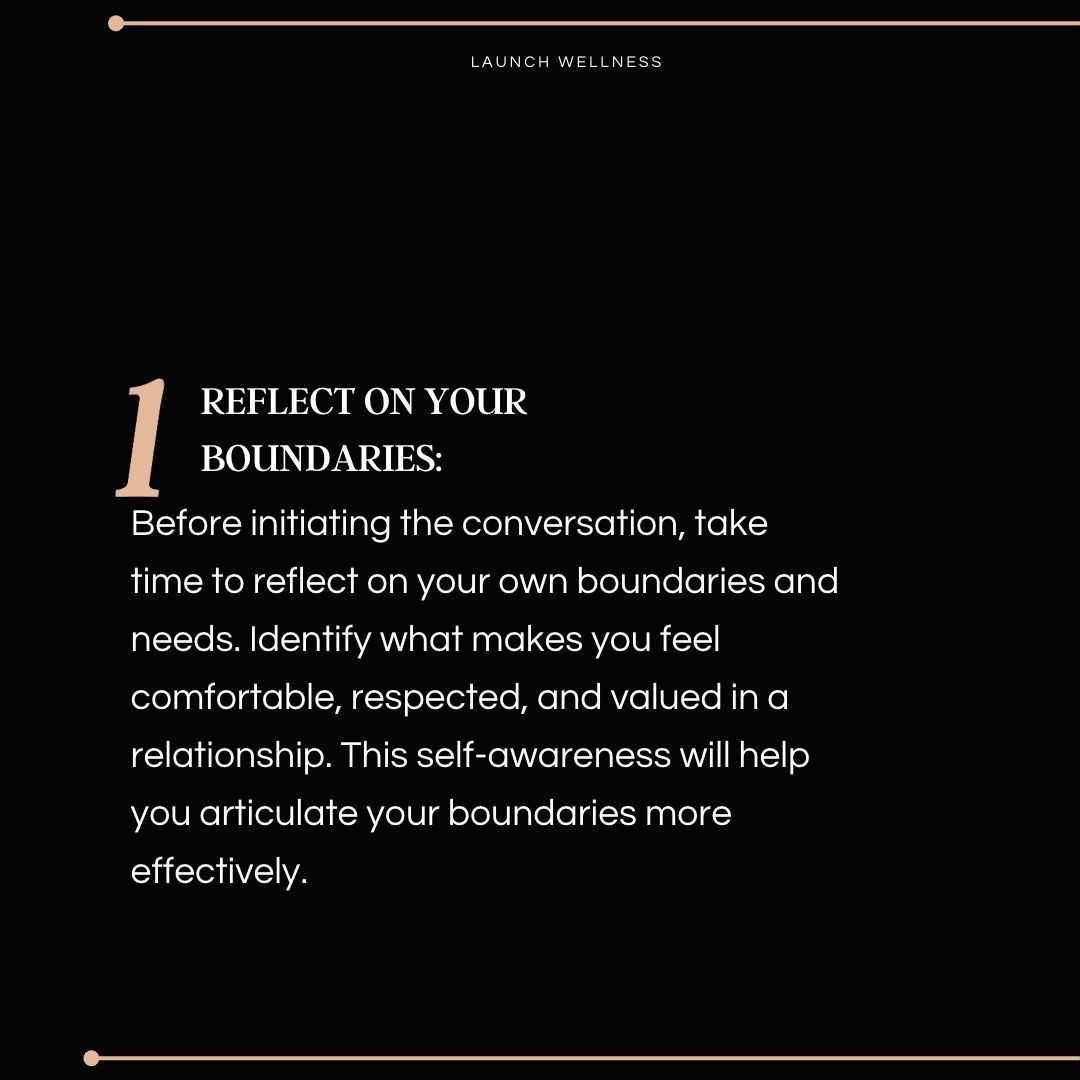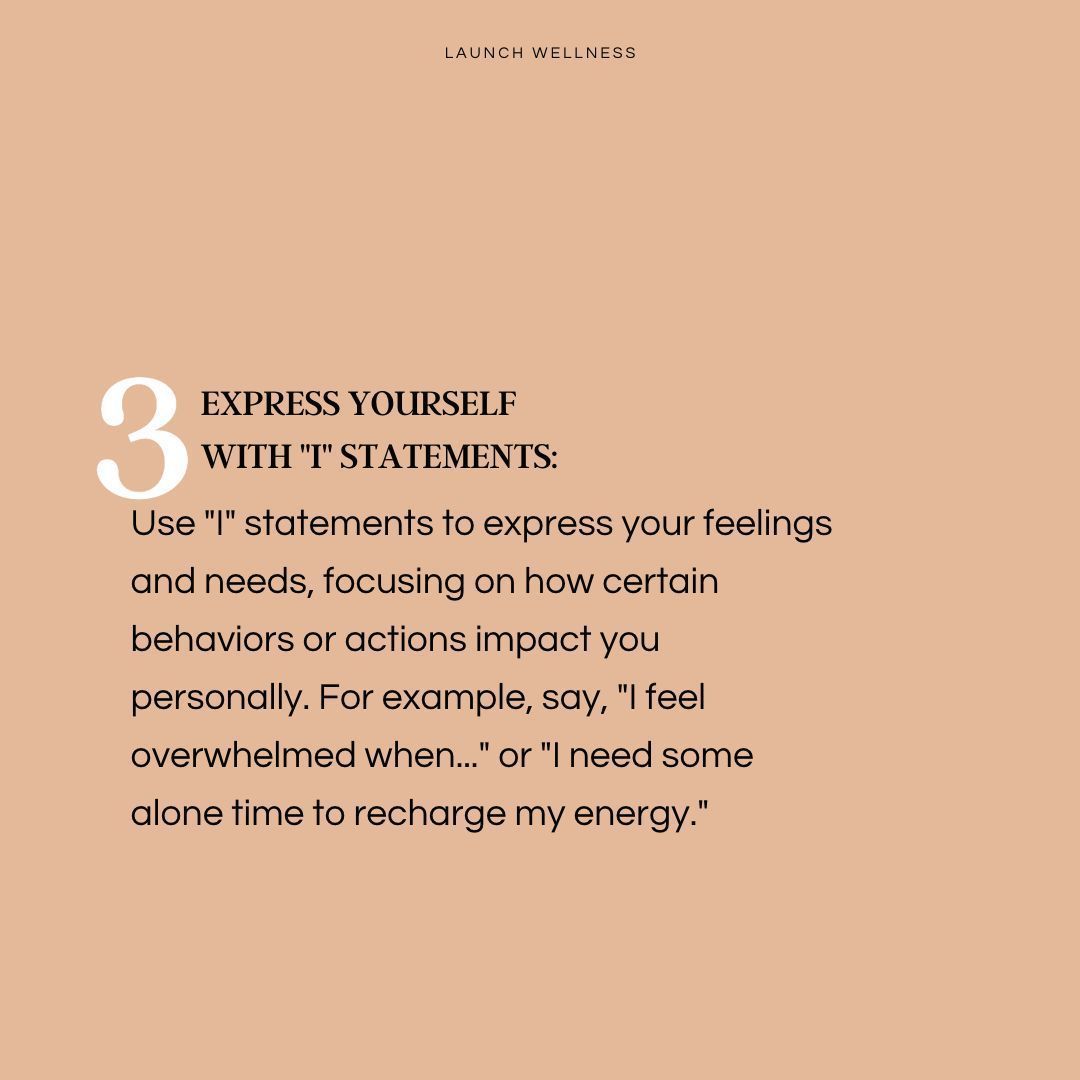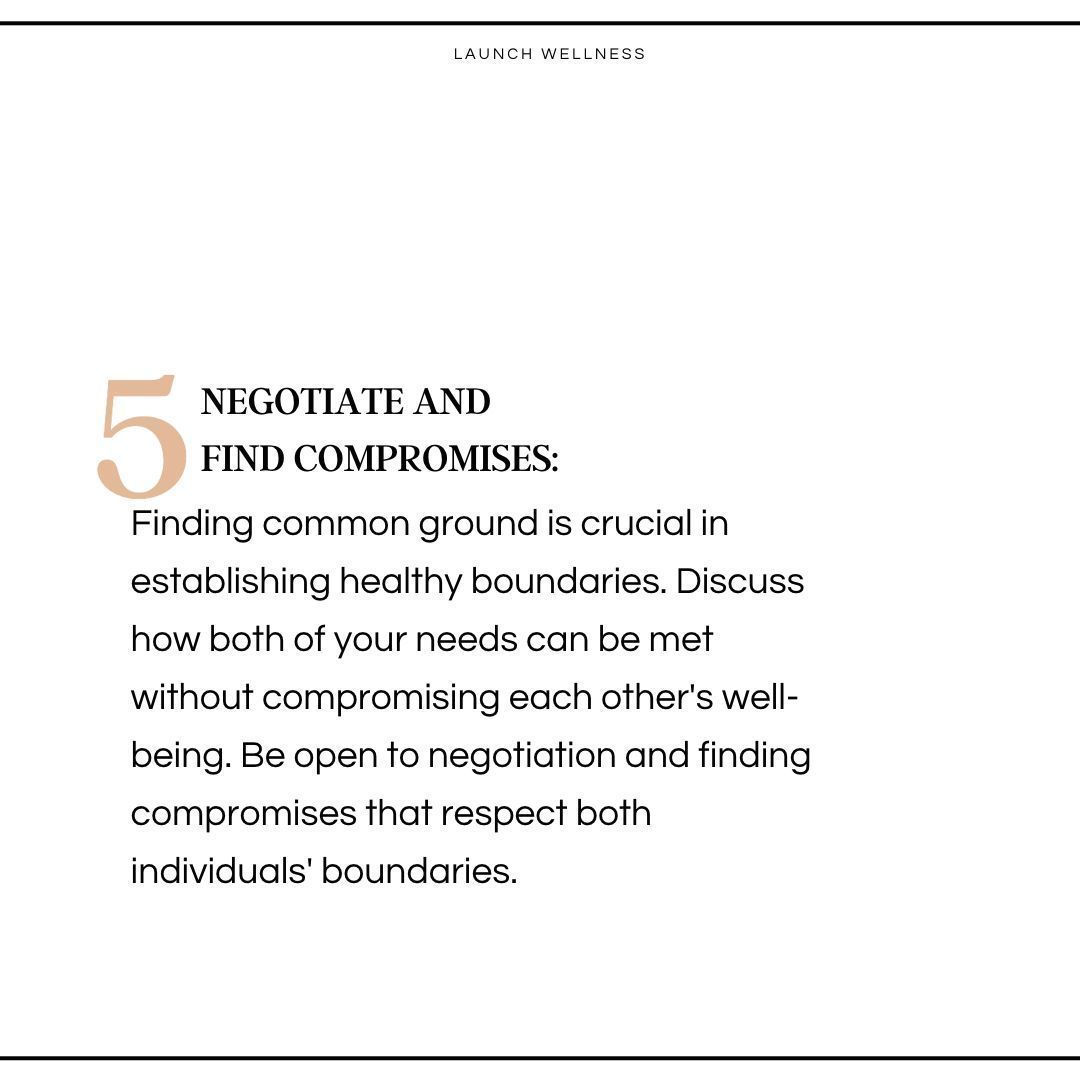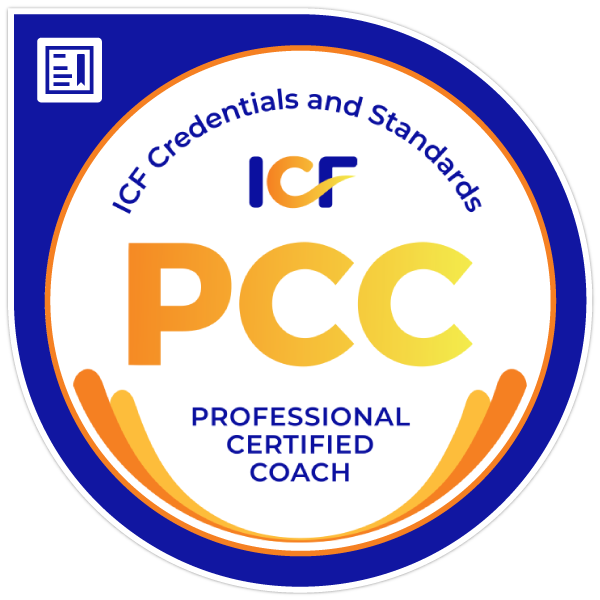Strategies to set healthy boundaries
Jessica Eagle • July 17, 2023

Boundaries are the invisible lines that protect our well-being and define our personal space. They create a safe and respectful environment where both partners can flourish. But let's face it, discussing boundaries can feel uncomfortable. Lets make it empowering and exciting!







Parenting, it's a journey like no other, isn't it? It's filled with highs and lows, joys and challenges, and a constant learning curve for both us and our children. It's easy to get caught up in the do's and don'ts, forgetting sometimes that parenting isn't just about guiding but also about understanding. I want to share the power of listening and allowing autonomy in our relationships with our children. It's about striking that delicate balance where we're not just overseeing but truly engaging with our children's thoughts, feelings, and decisions. Think about it. How often do we, as parents, find ourselves in a loop of instructing, directing, and, let's be honest, micromanaging? It's natural to want to protect our kids, to steer them clear of mistakes and hardships. But in doing so, are we inadvertently clipping their wings, not allowing them the room to grow, make mistakes, and learn from them? Natural consequences are an invaluable teacher. Take the simple example of laundry. If a child forgets or chooses not to do their laundry, the natural consequence isn't a lecture from us. It's them going to school in clothes that aren't fresh. Sure, they might face remarks from friends and a moment of discomfort, but it's a lesson they'll remember. It's real, tangible, and it sticks. This isn't about letting our kids falter for the sake of it. It's about letting them live through the natural outcomes of their choices, helping them connect the dots between action and consequence. We need to guide and walk beside our children, not in front or behind them. Our role is to be their compass, not their map. This means giving them the space to explore, make choices, and even face the music when it's called for. It's about showing trust in their capacity to handle life, step by step, decision by decision. Our children crave control over their lives, a sense that they're steering their ship. This isn't a trait that fades as they grow; it's a fundamental human desire, applicable at all stages of life. By listening more, by granting them autonomy, we're not just fostering their independence; we're building their confidence, their sense of responsibility, and their understanding of the world around them. So, let's take a step back sometimes. Let's be there to support, not smother; to guide, not dictate. Our children's journeys are their own to make, filled with lessons only life can teach. Our job? To listen, to allow, and to love – unconditionally. Through this, we're not just raising children; we're nurturing future adults who are resilient, thoughtful, and capable of navigating the complexities of life. In the end, isn't that what we all wish for as parents?

The teenage years are often perceived as a time of youthful exuberance, boundless energy, and carefree laughter. Yet, behind the smiles and seemingly carefree demeanor, teenagers navigate a complex landscape of challenges, both internal and external. The pressures of academics, social expectations, hormonal changes, and the ever-evolving digital world can take a toll on their mental and emotional well-being. As parents, it is crucial to delve deeper, understand the unspoken challenges faced by our teens, and provide the necessary support and guidance to help them navigate this transformative period of their lives. The Mask of Adolescence: Adolescence is a phase of self-discovery, but it can also be a time of immense self-doubt. Many teenagers find themselves struggling with low self-esteem, body image issues, and a constant need for validation from their peers. The pressure to conform to societal standards and fit into certain molds can lead to emotional distress and a sense of isolation. Behind their smiles, teens often hide their insecurities, anxieties, and fears, afraid to burden others with their troubles. Academic Stress and Performance Pressure: Academic demands, intense competition, and the pursuit of future success can place an enormous weight on the shoulders of teenagers. The pressure to excel academically and secure a bright future can lead to excessive stress, anxiety, and even depression. The fear of failure, overwhelming schedules, and the constant need to meet expectations can leave little room for relaxation and self-care. Recognizing the signs of academic stress and fostering a healthy approach to achievement is crucial for parents in supporting their teens. Navigating the Digital World: In today's digital age, teenagers face unique challenges that previous generations did not encounter. The omnipresence of social media, cyberbullying, and the pressure to maintain an online persona can deeply impact their mental well-being. The unrealistic standards portrayed on social media platforms can lead to feelings of inadequacy, comparison, and anxiety. Parents need to guide their teens in establishing healthy online boundaries, fostering digital literacy, and encouraging open communication about the digital world's potential pitfalls. Emotional Turmoil and Mental Health: The teenage years are characterized by a whirlwind of emotions as hormonal changes and the transition to adulthood take place. Teenagers may struggle with mood swings, heightened emotions, and difficulty regulating their feelings. Additionally, mental health conditions such as anxiety, depression, and eating disorders can emerge or worsen during this time. Recognizing the signs of emotional turmoil and addressing mental health concerns with empathy and professional support are essential steps parents can take to help their teens. Effective Communication and Active Listening: One of the most powerful ways parents can support their teens is by establishing open lines of communication. Creating a safe and non-judgmental environment where teenagers feel heard and understood is crucial. Active listening, empathy, and validating their experiences can go a long way in helping them navigate their challenges. Parents should also encourage their teens to express their emotions, provide guidance when needed, and seek professional help when necessary. Promoting Self-Care and Well-being: Teaching teens the importance of self-care and prioritizing their well-being is an invaluable lesson. Encouraging healthy lifestyle habits, such as regular exercise, proper nutrition, and adequate sleep, can significantly impact their overall mental and physical health. Additionally, helping them explore healthy coping mechanisms, such as engaging in hobbies, practicing mindfulness, and seeking support from friends and family, can provide valuable tools for managing stress and building resilience. Conclusion: Behind every teenager's smile lies a unique journey filled with both triumphs and struggles. Understanding the unspoken challenges faced by teens is the first step toward supporting them effectively. By fostering open communication, promoting self care, and providing guidance, parents can create an environment where their teens feel safe, understood, and empowered. Together, we can help our teenagers navigate the complexities of adolescence, ensuring their mental and emotional well-being as they transition into adulthood.

In an era driven by pharmaceutical advancements, concerns are growing regarding the excessive prescribing of medication to address ordinary emotional experiences. While medication plays a vital role in treating clinical disorders, it is essential to question whether every human emotion requires pharmacological intervention. This article explores the notion that feelings, such as sadness and loss following a breakup, are natural processes that individuals need to work through, rather than relying solely on medication. The Prevalence of Over-Prescribing The medical community faces increasing pressure to prescribe medications for emotional distress. Society's desire for instant relief and quick-fix solutions has contributed to the over-prescribing of medications for feelings that are a part of the normal human experience. Consequently, people are becoming overly dependent on pharmaceuticals to cope with life's inevitable challenges. The Breakup Experience: Sadness and Loss Breakups, a common occurrence in romantic relationships, often evoke emotions of sadness and loss. These feelings are normal reactions to the termination of a significant relationship. While the pain may be intense, it is crucial to acknowledge that experiencing these emotions is a necessary part of the healing process. By numbing or suppressing these emotions with medication, individuals may inadvertently impede their personal growth. Rather than confronting and processing their feelings, they risk prolonging the healing process and missing out on opportunities for self-reflection and self-discovery. Instances of Medication Over-Reliance Unfortunately, the over-reliance on medication for ordinary emotional experiences extends beyond the breakup scenario. Instances where medication is frequently prescribed instead of addressing underlying feelings include: Stress and Anxiety: In a society plagued by stress and anxiety, individuals are often prescribed medication as a first-line treatment, without fully exploring the root causes or considering alternative interventions. While medication can provide temporary relief, it does not address the underlying issues contributing to the distress. Bereavement: The loss of a loved one is a deeply emotional experience that naturally involves grief and sorrow. While it is essential to seek support during such times, relying solely on medication to suppress these emotions may hinder the healing process and impede the necessary mourning and acceptance. Work-related Burnout: As work demands increase, many individuals face burnout, experiencing exhaustion, cynicism, and reduced efficacy. While medication may temporarily alleviate the symptoms, it does not address the systemic issues contributing to burnout. Lifestyle adjustments, self-care, and creating healthier work environments are more sustainable solutions. The Importance of Therapy, Coaching, and Support Instead of resorting to medication alone, individuals experiencing emotional distress can benefit from therapy and support systems. Mental health professionals offer guidance in navigating complex emotions, providing coping strategies, and facilitating personal growth. Through therapy and coaching individuals can develop effective tools to manage their emotions, fostering long-term resilience and emotional well-being. Exploring Alternative Approaches Beyond therapy and coaching, various alternative approaches can complement the healing process. Engaging in physical exercise, maintaining a healthy lifestyle, practicing mindfulness or meditation, and nurturing meaningful relationships can all contribute to emotional well-being. These self-care practices empower individuals, enabling them to actively navigate their emotional journey. Let's Consider While medication undoubtedly plays a crucial role in addressing clinical disorders, the reflexive tendency to prescribe medication for every emotional experience warrants careful consideration. The breakup experience, characterized by sadness and loss, is a natural process that fosters personal growth. By embracing these emotions and seeking appropriate support, individuals can develop emotional resilience and overcome distress holistically. Promoting a shift away from over-prescribing and emphasizing therapy, coaching, self-care, and personal growth will foster a society that prioritizes emotional well-being. It is imperative to reevaluate our approach to emotional distress, acknowledging that not every feeling necessitates medication. Sometimes, what we genuinely need is the courage to face and grow from life's inevitable challenges.






